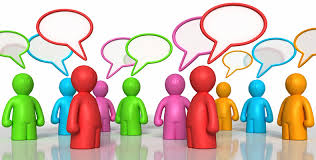Communication can be defined as the process of sharing of thoughts, ideas and information among people to reach a common understanding. The process involves the following:
- A sender
- A Message
- Encoding
- Media
- Decoding
- A Receiver
- Feedback
Actions or situations which obstruct the above cycle of communication are known as Barrier to Effective Communication. These barriers can be of many types:
- Semantic 2. Psychological
- Organisational 4. Personal
SEMANTIC BARRIERS
Such barriers arise when there is a problem in the process of encoding and decoding of the ideas into words.
- BADLY EXPRESSED MESSAGE: It occurs due to the usage of wrong words, certain omissions, confusing sentence structure, etc.
- WORDS WITH DIFFERENT MEANINGS: One word can have different meanings. It is very important that each worker understands the message in the correct context.
- FAULTY TRANSLATIONS: Sometimes the ideas which are drafted in one language (English) might have to be translated into another language (Hindi) so that the workers can understand it. This process of translation can cause many errors.
- UNCLARIFIED ASSUMPTIONS: When a message is communicated, there might be a difference in the assumptions formed by the receiver and the assumptions intended to reach the receiver. Hence, doubts must always be entertained by the sender of the message.
- TECHNICAL JARGON: Specialists may use the technical language related to their field while explaining processes to the workers. This must be avoided as they might not understand it.
- BODY LANGUAGE AND GESTURE DECODING: The sender of the message may convey two opposite things if his body language and gestures don’t match what he is saying. Proper care must be taken.
PSYCHOLOGICAL/EMOTIONAL BARRIERS
Such barriers when there is difference in the state of mind of the sender and receiver of the message.
- LACK OF ATTENTION: Listening with proper attention and focus is a very important part of communication. People who don’t listen properly might not perceive the information correctly.
- LOSS BY TRANSMISSION AND POOR RETENTION: When a message passes orally among various groups, there is always a loss of information or transmission of an inaccurate message.
- DISTRUST: Sometimes, the workers don’t trust their superiors. This feeling of distrust doesn’t allow them to perceive the message in its original sense.
- PREMATURE EVALUATION: Some people have the tendency to judge a situation even before the full message is conveyed. This is called Premature Evaluation.
ORGANISATIONAL BARRIERS
Such barriers arise due to incompatibility with the rules and regulations, organisational structure or authority-responsibility relations.
- ORGANISATIONAL POLICY: Some companies don’t provide an environment for the free flow of information. Such policies destroy the basic intention of communication.
- RULES AND REGULATIONS: Certain rules and regulations might prevent or cause delay in transmission of information.
- STATUS: If the superior or manager is concerned about his position and status he might not allow the workers to express themselves freely.
- COMPLEXITY IN ORGANISATIONAL STRUCTURE: In the case of a large company, communication and decision making get delayed due to numerous managerial levels.
- ORGANISATIONAL FACILITIES: The lack of frequent feedbacks and suggestions can not only restrict information but also hamper the chance of betterment of communication systems.
PERSONAL BARRIERS
Such barriers are mainly related to the personal feelings of both the sender and the receiver of the message.
- FEAR OF CHALLENGE TO AUTHORITY: Sometimes, a superior may withhold certain information if his authority would be getting affected.
- LACK OF CONFIDENCE OF SUPERIOR ON HIS SUBORDINATE: If the superior feels that his employees are not competent, he might not ask for their opinions on certain matters.
- UNWILLINGNESS TO COMMUNICATE: In certain cases, the workers might not communicate with their superior because their interests might get affected.
- LACK OF PROPER INCENTIVES: Subordinates don’t feel like taking the initiative to communicate if proper motivation is not provided.
The above barriers may make the task of communication challenging but if proper efforts are made by an organisation it can facilitate free flow of ideas.
Click here for government certification in Management





19 Comments. Leave new
Everyone should definitely follow these tips!
liked it
nice tips
excellent post
well explained with good points
Well presented. Detailed and to-the-point. I wish you would have discussed the tips in a little detail. It would have served a cherry on the cake!
Very well explained!
Elaborate. Well done.
Its such a well explored and detailed article and an interesting read 🙂
Great 🙂
Well researched
Fair mentioned barriers but I think it could have been if more emphasis was given on how to remove them implicitly.
A well researched article. A helpful to improve communication.
A well presented article and in detail on how we should try to overcome of the most commonly faced problems in our lives.
True, that if we are not able to communicate properly then we might not be able to identify or enhance our skills and hidden talents.
A very well represented solution to the problem
great one
Totally agreed, this needs to be brought into so much attention in all parts of the world, in all professions and among all types of people!
Well researched!
well and good
well and good article its useful